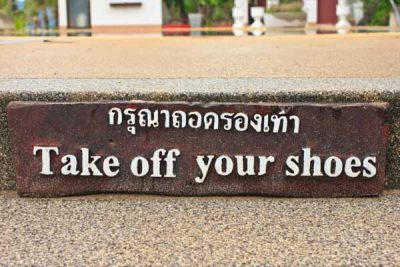
Etiquette is very important to Thais, and though they might be more tolerant of foreigners visiting their country, knowing a few important dos and don’ts will certainly make it much easier during your stay in Thailand. Thai people are polite and non-aggressive by nature and expect the same of others – they will seldom display their displeasure with your rude behaviour, but you could be getting yourself into a troubled situation if you disrespect a few important aspects of their culture.
The Thai are a proud nation of people with a long history and complex hierarchal structure of status. Starting with the Royal family and percolating down, everyone in Thailand knows and respects their place in society. A polite Thai (which is most of them) will usually immediately identify whether another is of higher status than them (usually deemed by age or wealth) and initiate the wai – a submissive and graceful bringing together of the hands to the chest or beneath the nose (to show respect). Even on a social level, they will refer to their elders as pii (older sibling). In fact social grace is paramount and the formal suffix kha (female) and khrap (male) is added to the end of all sentences when addressing strangers, employers/employees or elders.
There are many other habits of etiquette, which the foreigner will do well to observe; the most important being to avoid loss of face by losing your temper. No matter how displeased you are as a customer, raising your voice and showing confrontational emotion will often get you nowhere. There are other ways to complain but Thais are affronted by any embarrassment from a public ‘ticking off’.
The feet are considered dirty and should not be pointed directly at people or raised; shoes are usually never worn in indoor living areas and the head is sanctified, so avoid touching someone else on the head, unless they are an intimate friend. Contrary to popular impression, Thais are quite conservative and expect visitors to dress appropriately in formal public places. They are also discreet about showing affection, especially in public. Holding hands is considered taboo among the older generation.
While Westerners tend to pick up subtleness in tone of voice to indicate someone’s mood, Thais read more into your body language and approach. Emphasis is usually placed on passiveness and although they are used to foreigners being abrupt, it pays to smile constantly and go gently. Most Thais will ask in the softest possible way when they require a favour from someone above them. Eye contact is a common and important method of placing strangers at ease and there is good reason why Thailand is known as ‘the land of smiles’.
The Thai are incredibly patient and forgiving in an imperfect society and are happy to accept things as they are. The best you can do as a foreigner is to offer a soft laugh in testing situations, and say ‘mai-pen-rai’ (never mind) – a frequently-used excuse. Their lives move at a different pace to most Westerners.
For most Thai people – even in the modern era – acting appropriately to maintain, or improve, your status is extremely important and this goes some way towards explaining their desire for material gain and wealth. Above all, they adore their King and greatly respect the Royal family; indeed his Highness King Bhumibol (Rama IX) of the current Chakri dynasty (and the world’s longest reigning monarch still alive) is hugely respected for his compassionate servitude to the entire nation, along with Queen Sirikit. Criticising or showing disrespect to the Royal Institution can land you in jail on lese majeste charges.
Thai cultural behaviour is far-reaching and subtle, and often creates some frustration for foreigners who are unaware of the cultural habits that may influence everyday business and service. For an in-depth, albeit slightly dated, insight we recommend Robert and Nanthapa Cooper’s Culture Shock: Thailand (Times ISBN: 981 204 157 5).
